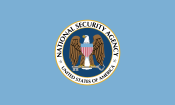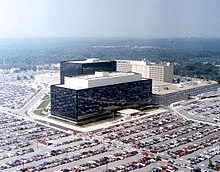Bí-kok kok-ka an-choân-kio̍k
 Bí-kok kok-ka an-tsuân-kio̍k ê ìn-sú | |
 Bí-kok kok-ka an-tsuân-kio̍k ê kî-á | |
 NSA tsóng-pōo, Maryland tsiu Fort Meade, tāi-iok tī 1986. | |
| Agency overview | |
|---|---|
| Formed | 1952 nî 11 goe̍h 4 ji̍t[1] |
| Preceding agency |
|
| Headquarters |
Bí-kok Maryland tsiu Fort Meade 39°6′32″N 76°46′17″W / 39.10889°N 76.77139°W |
| Motto | "Hông-uī lán-ê kok-ka. Kòo-an lan-ê bī-lâi."(Defending Our Nation. Securing the Future.) |
| Employees | Ki-bi̍t (kóo-kè 30,000–40,000)[2][3][4][5] |
| Annual budget | Ki-bi̍t (kóo-kè $10.8 tsa̍p-ik, 2013)[6][7] |
| Agency executives |
|
| Parent agency | Bí-kok kok-hông-pōo |
| Website |
NSA |
Bí-kok kok-ka an-tsuân-kio̍k (ing-gú: National Security Agency (NSA); Kok-ka po-an-kio̍k ) sī Bí-kok kok-hông-pōo ê kok-ka-kip tsîng-pò ki-kòo, lē-sio̍k Bí-kok kok-ka tsîng-pò tsóng-kàm (DNI). NSA hū-tsik uī kok-lāi-guā tsîng-pò kah huán-tsîng-pò bo̍k-ti̍k tuì sìn-sit hām sòo-kì tsìn-hîng tsuân-kiû kàm-khòng, siu-tsi̍p hām tshú-lí, tsuan-mn̂g gián-kiù kiò-tsò sìn-hō tsîng-pò (SIGINT) ê ha̍k-kho. NSA iah-koh hū-tsik pó-hōo Bí-kok ê thong-sìn bāng-lōo kah sìn-sit hē-thóng.[8][9] Bí-kok kok-ka an-tsuân-kio̍k uá-khò kok-tsióng tshòo-si lâi uân-sîng i-ê jīm-bū, kî-tiong tuā-pōo-hūn sī pì-bi̍t ê.[10] NSA ê tsûn-tsāi it-ti̍t-kàu 1975-nî tsiah-hông phi-lōo. NSA ióng-iú tāi-iok 32,000 miâ ê guân-kang.[11]
NSA khí-guân teh jī-tsiàn tang-tiong phò-i̍k bi̍t-bé thong-sìn ê tan-uī, tī 1952-nî iû Harry S. Truman tsóng-thóng tsìng-sik sîng-li̍p kiò-tsò NSA. Uì hit-tang-tsūn khai-sí kàu líng-tsiàn kiat-sok, uì hit-tang-tsūn kàu líng-tsiàn kiat-sok, NSA tsiânn-tsò Bí-kok siōng-tuā ê tsîng-pò ki-kòo. Jîn-guân hām ū-suàn, m̄-kù tsia̍t-tsí 2013-nî ê khó-iōng sìn-sit piáu-bîng, Bí-kok tiong-iong tsîng-pò-kio̍k (CIA) teh tsit hong-bīn líng-sian, ū-suàn uî 147 ik bí-guân.[6][12] NSA bo̍k-tsiân teh tsuân-kiû huān-uî lāi tsìn-hîng hái-liōng sòo-kì siu-tsi̍p, pīng-tshiánn í-king tsai-á ē-teh bu̍t-lí siōng tuì tiān-tsú hē-thóng tsìn-hîng kòo-tsiong tshú-lí, tse-sī si̍t-hiān tsit-ê bo̍k-tik ê tsi̍t-tsióng hong-huat.[13] NSA iah-koh hông tsí-khòng tsi-tshî Stuxnet tíng-tíng ê kong-kik nńg-thé, tsit-ê nńg-thé giâm-tiōng phò-hāi Iran ê hi̍k kè-uē.[14][15] NSA kah CIA tàu-tīn teh tsuân-kiû tsiânn-tsē kok-ka lóng-ū si̍t-thé tsûn-tsāi; CIA/NSA liân-ha̍p ti̍k-pia̍t siu-tsi̍p ho̍k-bū (tsi̍t-ê ko-tōo ki-bi̍t ê tsîng-pò thuân-tuī) teh ko-kè-ta̍t bo̍k-piau (pí-jû Tsóng-thóng-hú-gê hi̍k-tsiá tāi-sài-kuán) lāi-té an-tsong tshiat-thiann siat-pī. Kì-tshing, SCS siu-tsi̍p tshik-lio̍k pau-kuat "bi̍t-tshiat kàm-sī, ji̍p-sik tshiat-thau, tshiat-thiann, [kah] phò-hāi hām tsông-ji̍p".[16][17]
Kah tsú-iàu tsiông-sū guā-kok-lâng kàn-tia̍p ua̍h-tāng ê tiong-iong tsîng-pò-kio̍k hām kok-hông tsîng-pò-kio̍k (DIA) bô kâng, Bí-ko kkok-ka an-tsuan-kio̍k bô kong-khai tsìn-hîng jîn-li̍k tsu-guân tsîng-pò siu-tsi̍p. NSA siū-thok uī kî-thann tsìng-hú tsoo-tsit thê-kiong hia̍p-tsōo kah hia̍p-tiau sìn-hō tsîng-pò iàu-sòo——huat-lu̍t kìm-tsí tsia--ê tsoo-tsit ka-kī tsiông-sū tsit-khuán-hîng ê ua̍h-tāng.[18] Tsok-uî tsia--ê tsit-tsik ê tsi̍t-pōo-hūn, tsit-ê ki-kòo ū tsi̍t-ê miâ kiò-tsò tiong-iong an-tsuân-kio̍k (CSS) ê kāng sóo-tsāi ê tsoo-tsit, CSS i tshiok-tsìn NSA kah kî-thann Bí-kok kok-hông bi̍t-bé hun-sik pōo-mn̂gb tsi-kan ê ha̍p-tsok. Uī-tio̍h tsìn-tsi̍t-pōo khak-pó sìn-hō tsîng-pò siā-khu pōo-mn̂g tsi-kan ê koo-thong thong-tháu, NSA kio̍k-tiúnn tông-sî kiam-jīm Bí-kok bāng-lōo su-līng-pōo su-līng hām tiong-iong an-tsu-kio̍k kio̍k-tiúnn.
NSA ê hîng-tōng pat tsiânn-tsē pái ín-huat tsìng-tī tsing-gī, pau-kuat tuì huán Ua̍t-tsiàn líng-tō-jîn ê kàn-tia̍p ua̍h-tāng í-ki̍p tsit-ê ki-kòo tsham-ú king-tsè kàn-tia̍p ua̍h-tāng. Tī 2013-nî, NSA tsi-tsîng ê sîng-pau-siong Edward Snowden hiòng kong-tsiòng thong-iông NSA ê tsiânn-tsē pì-bi̍t kam-si kè-uē. Kin-kì sia̍p-lāu ê bûn-kiānn, NSA tsia̍t-hi̍k koh tû-tsûn tsuân-kiû tshiau-kuè 10 ik lâng ê thong-sìn tsu-liāu, kî-tiong pau-kuat Bí-kok kong-bîn. Tsia--ê bûn-kiānn hián-sī, NSA sú-iōng tshiú-ki-á ê guân sòo-kì kin-tsong sòo-ik lâng ê hîng-tōng. Teh kok-tsè siōng, gián-kiù piáu-bîng NSA ū lîng-li̍k thong-kuè "huê-suân-pio lōo-iû" kàm-sī guā-kok ê internet liû-liōng.[19]
Tsù-kái[siu-kái | kái goân-sí-bé]
- ↑ Burns, Thomas L. (1990). "The Origins of the National Security Agency" (PDF). United States Cryptologic History. National Security Agency. p. 97. goân-loē-iông (PDF) tī 2016-03-22 hőng khó͘-pih.
- ↑ "60 Years of Defending Our Nation" (PDF). National Security Agency. 2012. p. 3. goân-loē-iông (PDF) tī 2013-06-14 hőng khó͘-pih. July 6, 2013 khòaⁿ--ê.
On November 4, 2012, the National Security Agency (NSA) celebrates its 60th anniversary of providing critical information to U.S. decision makers and Armed Forces personnel in defense of our Nation. NSA has evolved from a staff of approximately 7,600 military and civilian employees housed in 1952 in a vacated school in Arlington, VA, into a workforce of more than 30,000 demographically diverse men and women located at NSA headquarters in Ft. Meade, MD, in four national Cryptologic Centers, and at sites throughout the world.
- ↑ Priest, Dana (July 21, 2013). "NSA growth fueled by need to target terrorists". The Washington Post. July 22, 2013 khòaⁿ--ê.
Since the attacks of Sept. 11, 2001, its civilian and military workforce has grown by one-third, to about 33,000, according to the NSA. Its budget has roughly doubled.
- ↑ "Introverted? Then NSA wants you. Archived 2020-11-06 at the Wayback Machine." Florida Championship Wrestling. April 2012. Retrieved July 1, 2013.
- ↑ Rosenbach, Marcel; Stark, Holger; Stock, Jonathan (June 10, 2013). "Prism Exposed: Data Surveillance with Global Implications". Spiegel Online. Spiegel Online International. p. 2. "How can an intelligence agency, even one as large and well-staffed as the NSA with its 40,000 employees, work meaningfully with such a flood of information?"
- ↑ 6.0 6.1 Gellman, Barton; Greg Miller (August 29, 2013). "U.S. spy network's successes, failures and objectives detailed in 'black budget' summary". The Washington Post. p. 3. August 29, 2013 khòaⁿ--ê.
- ↑ Shane, Scott (August 29, 2013). "New Leaked Document Outlines U.S. Spending on Intelligence Agencies". The New York Times. August 29, 2013 khòaⁿ--ê.
- ↑ "About NSA: Mission". National Security Agency. September 14, 2014 khòaⁿ--ê.
- ↑ Ellen Nakashima (January 26, 2008). "Bush Order Expands Network Monitoring: Intelligence Agencies to Track Intrusions". The Washington Post. February 9, 2008 khòaⁿ--ê.
- ↑ Executive Order 13470 – 2008 Amendments to Executive Order 12333, United States Intelligence Activities, July 30, 2008 (PDF)
- ↑ Schorr, Daniel (January 29, 2006). "A Brief History of the NSA". NPR. September 15, 2021 khòaⁿ--ê.
- ↑ Bamford, James. Body of Secrets: Anatomy of the Ultra-Secret National Security Agency, Random House Digital, Inc., December 18, 2007
- ↑ Malkin, Bonnie. "NSA surveillance: US bugged EU offices". The Daily Telegraph, June 30, 2013.
- ↑ Ngak, Chenda. "NSA leaker Snowden claimed U.S. and Israel co-wrote Stuxnet virus", CBS, July 9, 2013
- ↑ Bamford, James (June 12, 2013). "The Secret War". Wired. goân-loē-iông tī January 25, 2014 hőng khó͘-pih.
- ↑ Ann Curry (anchor), John Pike (guest), Pete Williams (guest) and James Bamford (guest) (February 27, 2001). "Congress to Hold Closed Hearings on Accused Spy Robert Hanssen Later This Week". Today. NBC.
- ↑ Lichtblau, Eric (February 28, 2001). "Spy Suspect May Have Revealed U.S. Bugging; Espionage: Hanssen left signs that he told Russia where top-secret overseas eavesdropping devices are placed, officials say". Los Angeles Times. p. A1. goân-loē-iông tī April 17, 2001 hőng khó͘-pih.
- ↑ Executive Order 13470 – 2008 Amendments to Executive Order 12333, United States Intelligence Activities, Section C.2, July 30, 2008
- ↑ Obar, Jonathan A.; Clement, Andrew (July 1, 2013) [June 5–7, 2012]. Ross, P.; Shtern, J., pian. Internet Surveillance and Boomerang Routing: A Call for Canadian Network Sovereignty. TEM 2013: Proceedings of the Technology & Emerging Media Track – Annual Conference of the Canadian Communication Association. Victoria, British Columbia. doi:10.2139/ssrn.2311792. SSRN 2311792
 .
.
Tsham-khó bûn-hiàn[siu-kái | kái goân-sí-bé]
- Bamford, James. Body of Secrets: Anatomy of the Ultra-Secret National Security Agency, Random House Digital, Inc., December 18, 2007. ISBN 0-307-42505-3. Previously published as: Doubleday, 2001, ISBN 0-385-49907-8. (Eng-gí)
- Bauer, Craig P. Secret History: The Story of Cryptology (Volume 76 of Discrete Mathematics and Its Applications). CRC Press, 2013. ISBN 1-4665-6186-6.
- Weiland, Matt and Sean Wilsey. State by State. HarperCollins, October 19, 2010. ISBN 0-06-204357-9. (Eng-gí)
Ên-sin ua̍t-to̍k[siu-kái | kái goân-sí-bé]
| Tô͘-su-koán chu-goân about Bí-kok kok-ka an-choân-kio̍k |
- Adams, Sam, War of Numbers: An Intelligence Memoir Steerforth; new edition (June 1, 1998).
- Aid, Matthew, The Secret Sentry: The Untold History of the National Security Agency, 432 pages, ISBN 978-1-59691-515-2, Bloomsbury Press (June 9, 2009).
- Bamford, James, The Puzzle Palace, Penguin Books, 1982, ISBN 0-14-006748-5.
- Bamford, James, The New York Times, December 25, 2005; "The Agency That Could Be Big Brother".
- Bamford, James, The Shadow Factory, Anchor Books, 2009, ISBN 978-0-307-27939-2.
- Hanyok, Robert J. (2002). Spartans in Darkness: American SIGINT and the Indochina War, 1945–1975. National Security Agency. November 16, 2008 khòaⁿ--ê.
- Jackson, David (June 18, 2013). "Obama: NSA surveillance programs are 'transparent'". USA Today. June 18, 2013 khòaⁿ--ê.
- Johnson, Thomas R. (2008). American Cryptology during the Cold War. National Security Agency: Center for Cryptological History. November 16, 2008 khòaⁿ--ê.
- Radden Keefe, Patrick, Chatter: Dispatches from the Secret World of Global Eavesdropping, Random House, ISBN 1-4000-6034-6.
- Kent, Sherman, Strategic Intelligence for American Public Policy.
- Kahn, David, The Codebreakers, 1181 pp., ISBN 0-684-83130-9. Look for the 1967 rather than the 1996 edition.
- Laqueur, Walter, A World of secrets.
- Liston, Robert A., The Pueblo Surrender: A Covert Action by the National Security Agency, ISBN 0-87131-554-8.
- Levy, Steven, Crypto: How the Code Rebels Beat the Government—Saving Privacy in the Digital Age, Penguin Books, ISBN 0-14-024432-8.
- Prados, John, The Soviet estimate: U.S. intelligence analysis & Russian military strength, hardcover, 367 pages, ISBN 0-385-27211-1, Dial Press (1982).
- Perro, Ralph J. "Interviewing With an Intelligence Agency (or, A Funny Thing Happened on the Way to Fort Meade)". (Archive) Federation of American Scientists. November 2003. Updated January 2004. – About the experience of a candidate of an NSA job in pre-employment screening. "Ralph J. Perro" is a pseudonym that is a reference to Ralph J. Canine (perro is Spanish for "dog", and a dog is a type of canine)
- Shaker, Richard J. "The Agency That Came in from the Cold." (Archive Notices. American Mathematical Society. May/June 1992 pp. 408–411.
- Tully, Andrew, The Super Spies: More Secret, More Powerful than the CIA, 1969, LC 71080912.
- Church Committee, Intelligence Activities and the Rights of Americans: 1976 US Senate Report on Illegal Wiretaps and Domestic Spying by the FBI, CIA and NSA, Red and Black Publishers (May 1, 2008).
- "Just what is the NSA?" (video) CNN. June 7, 2013.
- "The NSA Files". The Guardian. London. June 8, 2013.
- "National Security Agency Releases History of Cold War Intelligence Activities." George Washington University. National Security Archive Electronic Briefing Book No. 260. Posted November 14, 2008.
- "The Snowden Archive". The Intercept. London. June 8, 2013.
Tsham-ua̍t[siu-kái | kái goân-sí-bé]
- The Daily Telegraph
- The Washington Post
- Florida Championship Wrestling
- Canadian Communication Association
- The Intercept
- Los Angeles Times
Guā-pōo liân-kiat[siu-kái | kái goân-sí-bé]
- Koaⁿ-hong bāng-chām (Eng-gí)
- National Security Agency – 60 Years of Defending Our Nation (Eng-gí)
- Records of the National Security Agency/Central Security Service (Eng-gí)
- The National Security Archive at George Washington University (Eng-gí)
- "United States Intelligence Community: Who We Are / NSA section". goân-loē-iông tī September 25, 2006 hőng khó͘-pih. (Eng-gí)
- National Security Agency (NSA) Archive on the Internet Archive (Eng-gí)
|
- Bí-kok kok-ka an-choân-kio̍k
- 1952 establishments in the United States
- Articles containing video clips
- Tiān-náu an-choân cho͘-chit
- Government agencies established in 1952
- Tōa-kui-bô͘ kàm-khòng
- Sìn-hō chêng-pò ki-kò͘
- Chhiau-kip tiān-náu chām-tiám
- Bí-kok kok-hông-pō͘ ki-kò͘
- Bí-kok chèng-hú pó-bi̍t-sèng
- Chêng-pò hun-sek ki-kò͘
